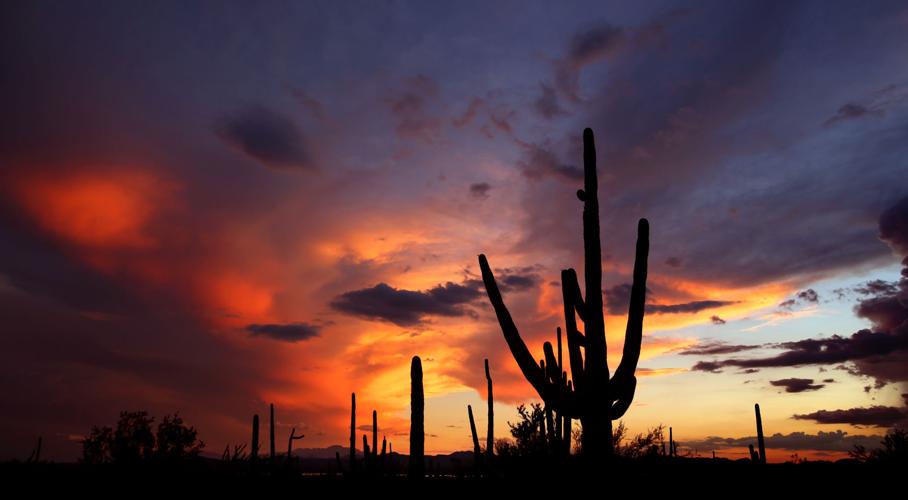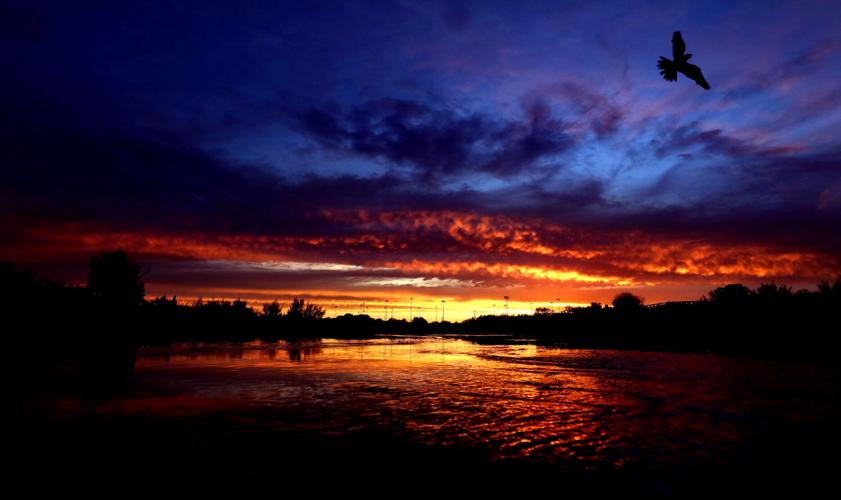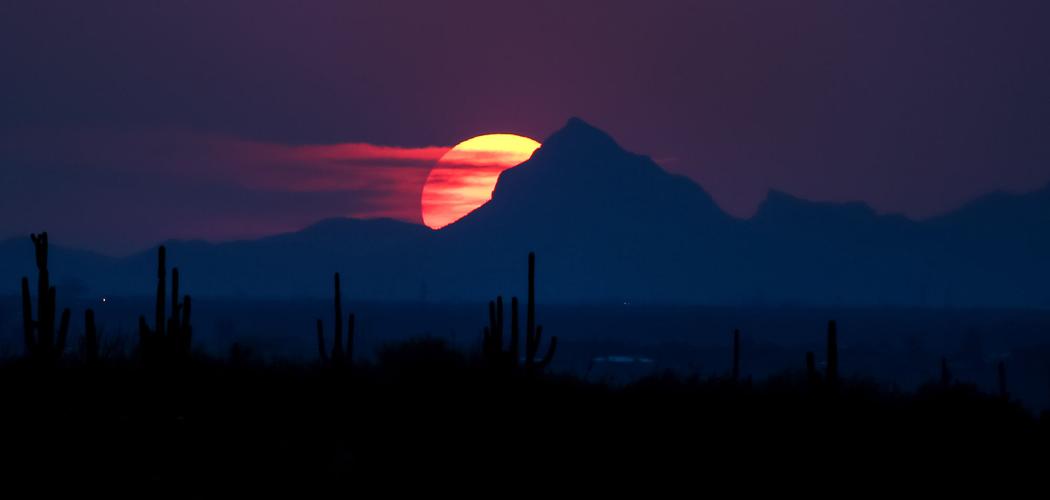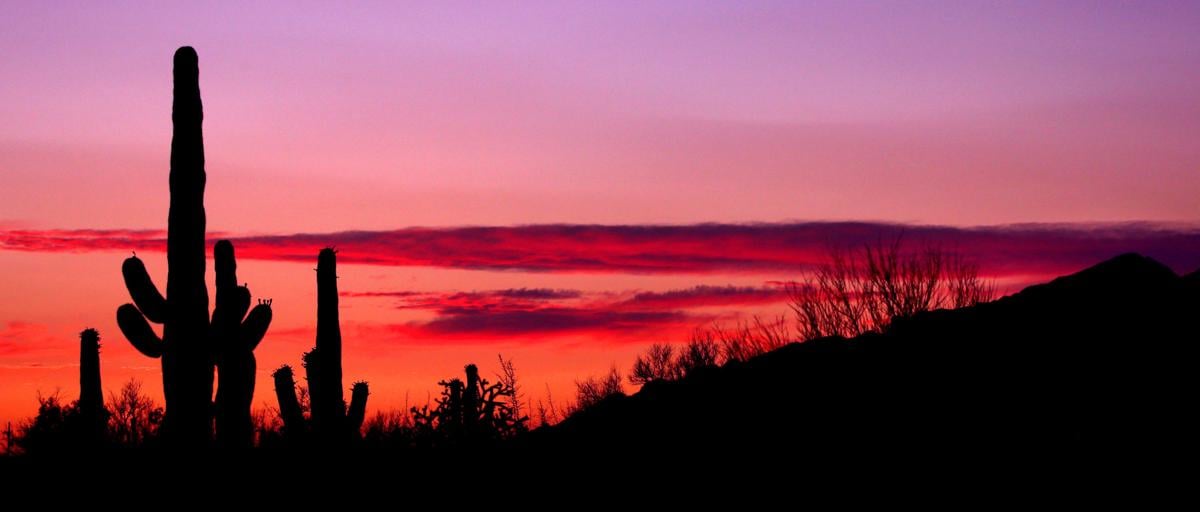It's almost time for Fourth of July fireworks, but most Tucsonans will probably agree that the spectacular show Mother Nature puts on every night when the sun sets is infinitely better than pyrotechnics.
If, like us, you think Tucson has the most spectacular sunsets in the world and always wondered why, we asked an expert for some illuminating insight.
Don McCarthy, is a University of Arizona astronomer and Distinguished Outreach Professor, who's been observing the skies for decades. And while for many of us sunsets are a beautiful end to a long day, for astronomers like McCarthy they mean the workday is just beginning.
"I watch them all the time, it's almost a religion," McCarthy says. "When you are an astronomer at a telescope, let's say Kitt Peak and you can walk outside of your telescope either the ground or the catwalk that surrounds the moving dome, which is up higher, you notice that everyone's doing this on the mountain watching the sunset and you get ready for a long night of observing."
Watching the sunset is together is also a daily camp activity at Astronomy Camp, a summer program for teens from all around the world that McCarthy runs on Mount Lemmon.
"It's a ritual for us to watch the sunset...," McCarthy says. "In fact, we've had staff members who have proposed marriage under those conditions on top of Mount Lemmon so it's near and dear to our heart."
Here are five things you should know about sunsets that will make you love and appreciate them even more.
Why Tucson is a prime place for stunning sunsets

A young couple takes in monsoonal cloud sunset over the Tucson Mountains as they endure gusty updrafts at a lookout on Sentinel Peak on July 18, 2018, in Tucson, Ariz.
Tucson has a couple things going for it that make it an ideal place for sunset watching, McCarthy explains.
First, we usually have pretty clear skies, so clouds aren't blocking our view. That's due to our latitude.
"So we're at 32 degrees latitude north, and the same can be said for 32 degrees latitude south, which is where Arizona and many other countries have put observatories," he says. "The natural weather cycle in the Earth's atmosphere is for air to rise at the equator and circulate around and that gives us a low humidity, high frequency of clear skies environment and so you're more likely to see them."
We also have plenty of wide open spaces.
"Tucson has a good horizon, so you're more likely to be able to see a sunset," McCarthy says. "You're not in the middle of big city or in a forest and you can go up these mountaintops and have a direct view of the sunset far away."
The science behind the sunset

Monsoon sunset over the cactus forest of the Saguaro National Park West, Wednesday, August 10, 2016, Tucson, Ariz.
Ever wonder why we see blue skies during the day and roaring red skies and a kaleidoscope of colors at sunset?
It's all because of the Earth's atmosphere.
"The color of the sun changes based on how much air you're looking through," McCarthy says. "At noontime, for example, the sun is as high as it's going to get in the sky, you're looking through the minimum atmosphere for that day. And when sunlight comes in, the blue light is affected more by the molecules of oxygen and nitrogen than the red light is and the result of that is the blue light is bounced around, the technical word is scattered. That's what gives us our daytime sky."
And when the sun sets the atmosphere is denser.
"As the sun proceeds lower and lower during the day when it gets to the horizon then you are looking through 40 times more air than you are at noontime, so because of that, the blue light has been almost entirely removed and the only color that's left is the red light," McCarthy says.
So sunsets will always be red-ish because the blue light doesn't filter through, but when there's anything mucking up the atmosphere the red will be more intense.
That could be dust from a recent storm, wildfire smoke or pollution in the air from Arizona, neighboring states or even from events happening halfway across the globe.
"There might be a volcanic eruption somewhere in the world that launches dust particles into the stratosphere ... and that will make the sunsets especially red too," McCarthy says. "Maybe there's even a dust storm in the Sahara desert that launches dust into the atmosphere, everything globally will be affected by that too, so under that circumstance you would see redder sunsets than normal."
There's a "badge of honor" for sunset watchers

Nighthawks weave through the sunset over the Rillito River, just barely running with the first significant monsoon rainfall of the season, Tucson, Ariz., July 23, 2020.
There's a pretty rare phenomenon that can be observed when the sun sets when all the conditions are just right.
"Our air acts like a prism, in other words it separates the colors, so you can have a slight separation between let's say green and red or whatever colors you want," McCarthy says. "The result of that is that the red sun sets before the green sun and you have a phenomenon called the green flash."
Because the green flash is so rare McCarthy says "it's like a badge of honor for people."
To see it, you first need a clear atmosphere, not just in Tucson but along the entire line of sight of the sun so you can see it go down below the horizon, McCarthy says.
"It depends on what the light is in California or the weather in California is going to be because remember, the sun's below the horizon and it's light is traveling this very long path to reach us so it's all along that path that you really need good conditions."
But that's not all.
"The best green flashes also need what's called a temperature inversion which means... a layer in the atmosphere that gets warmer instead of cooler and we often have that her in the desert at night because of our low humidity the ground actually gets colder than the air above it, that's an inversion," he says. "And that makes the light bend in a different way and that's more likely to produce the green flash."
McCarthy, who doesn't have good color vision can't really say he's earned his green flash badge of honor, but his students at Astronomy Camp can usually see it a couple times during their stay on Mount Lemmon.
The sunset is actually an illusion

The sun sets behind the Tucson Mountains as seen from S X-9 Ranch Road East of Tucson on August 23, 2020.
Prepare to have your mind blown.
"When you're looking at the sun at sunset, the light from the sun bends in the Earth's atmosphere," McCarthy says. "If you took away the atmosphere, the sun would set eight minutes earlier and rise eight minutes earlier, but the bending lets it linger a little longer. From our perspective, it's an illusion."
So when we see the sun set, we're actually late to the party.
"The sun's light doesn't follow a straight line. When you are looking at it on the horizon, it's actually below the horizon, it set eight minutes earlier," McCarthy says. "And its light is bent by that by the density of air in the atmosphere and comes to us horizontally. So we see it set but it's actually eight minutes off."
Sometimes the best place to see the sunset is behind you

The Earth's shadow and the Belt of Venus.
It's easy to be captivated by the changing colors dancing across the sky in the west when the sun is setting.
"But sometimes the best place to watch a sunset is exactly in the opposite direction," McCarthy says.
Because of our mostly clear skies you might be able to observe some other pretty spectacular phenomena.
First, picture the design of the Arizona flag with rays of sun radiating from a central point.
"They're called crepuscular rays where clouds on the horizon will have holes between them and let through beams, if you will, of sunlight and those appear to come from a point and spread outwards like railroad tracks converging to a point," McCarthy says. "So the rays are all parallel but they seem to come from one place and fan out and if you turn around and look the opposite direction you'll see them again come to a point. So to go all the way across the sky and converge on the backside. That's kind of cool and you're just not going to see that in most places that don't have that kind of visibility."
You might also see what's known as the Belt of Venus.
"The reason we see the sun set is we are now in the Earth's shadow that projects out in the opposite direction toward the east through the Earth's atmosphere," McCarthy says. "It makes a dark band across the horizon to the east and at the top of that dark band is what is called the Belt of Venus, it's a pink area, a pink band on top of a dark band."
The red light of the sun is being reflected back to us which makes the pink band and unlike the green flash you can see the Belt of Venus pretty much on any clear night.
"It would help to have a clear horizon to see the shadow of the Earth and the Belt of Venus, in other words away from buildings so that you can see a distance away, you can see the profile of mountains in the back without obstruction."










